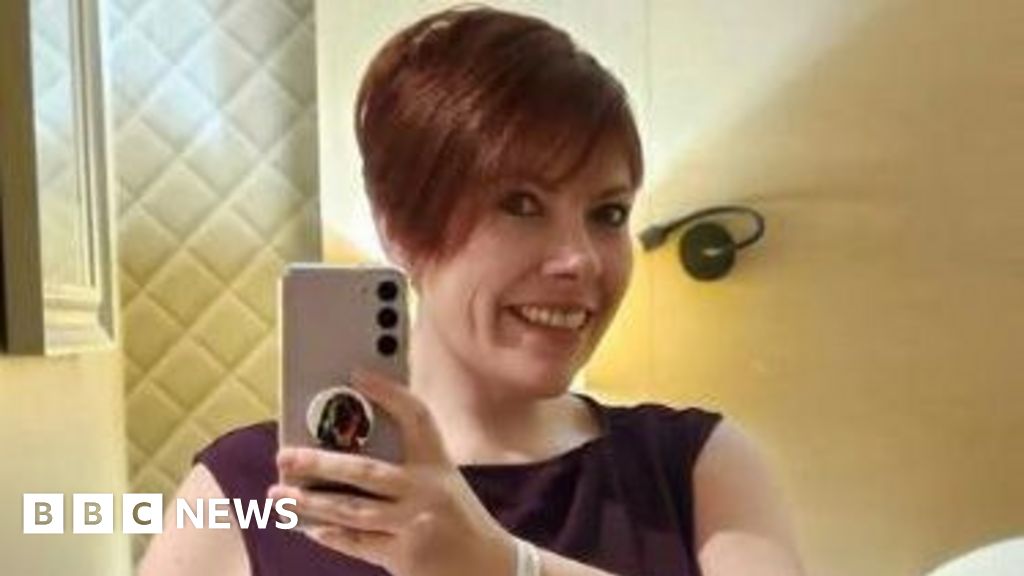Lynette HorsburghNorth West
 Family photograph
Family photographA woman still living with the side effects of treatment for a childhood brain tumour more than three decades ago is helping research to improve the quality of life for other survivors.
Kat Watson-Wood, of Bury, Greater Manchester, was diagnosed with a brain tumour the size of a tangerine at the age of four.
She had major surgery and intensive radiotherapy and, while she remains cancer free, 33 years on she still faces the impact of the treatment and uses a wheelchair for mobility and has cognitive challenges and fatigue, which led to her giving up nursing.
She said wanted to cut the long-lasting impact of childhood cancers to “give something back” and “make something good out of a bad thing”.
 Kat Watson-Wood
Kat Watson-WoodShe said: “Just before my fourth birthday apparently I started walking with an unusual gait. I was staggering and walking into things.”
As well as major surgery and radiotherapy, she faced years of hormone medication to prevent premature puberty, a common complication of treatment for childhood brain tumours near the pituitary gland, which controls hormones.
“Survival rates in the 90s weren’t fantastic. I don’t know anyone else like me. Nobody knew about the issues around side effects at the time.”
She said she does not remember a lot from back then but “sometimes get flashbacks”.
“Smells trigger memories for me and sometimes I’ll just burst into tears,” said Mrs Watson-Wood, who married husband, Matt, in 2021.
She said there had been “dark times”, such as leaving nursing six years ago “because my body just wasn’t able to do it”.
She said she was inspired to train as a nurse by the amazing care she had received during her treatment.
 Family photograph
Family photographMrs Watson-Wood uses a crutch and a wheelchair and has cognition issues and problems with her memory, which can also affect her speech, and she gets very tired.
“I realise I’m very lucky. I’m here and I want to give something back to research to help keep improving things,” she said during this month’s Childhood Cancer Awareness Month.
“I’m trying to make some good out of a bad thing. And show that you can live a successful and happy life even with side effects.”
Mrs Watson-Wood, who has retrained as an IT executive since leaving nursing, has joined the panel of BRAINatomy – a transatlantic research project funded by Cancer Research UK, Stand Up to Cancer and Stand Up To Cancer USA – investigating the long-term side effects of radiotherapy on children with brain tumours.
She has regular meetings with researchers at The Christie, The University of Manchester and teams based in Memphis, US, and Groningen, Netherlands, which aims to reduce the side effects of treatment by identifying the most radiation-sensitive parts of the brain so that they can be avoided during radiotherapy and proton beam therapy.
 Family photograph
Family photographDr Angela Davey, from the University of Manchester, who is working on the project said: “By studying large sets of real-world data from children treated in the past, we have already identified areas of the brain where radiation exposure is associated with problems with learning and hormone regulation.”
She said the research project was essential as clinical trials in children to test different exposures to healthy tissues during radiotherapy were not feasible.
Prof Marianne Aznar, lead for BRAINatomy at the university, said the project aimed to help clinicians “design kinder treatments for children and improve quality of life for cancer survivors”.
Jemma Humphreys, of Cancer Research UK, said: “Cancer is different in children and young people – from the types of cancer that affect this age group, to the long-term effects of treatment such as hearing loss and infertility.
“So, it needs a different and dedicated approach that we’re grateful to our supporters for helping to make possible.”
Mrs Watson-Wood said: “Research has come a long way in the last 30 years.
“I hope this research will help reduce if not eradicate long lasting side effects for future generations.”





